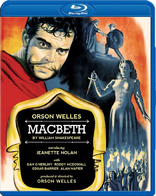Macbeth Blu-ray Movie
HomeMacbeth Blu-ray Movie 
Olive Films | 1948 | 107 min | Not rated | Sep 18, 2012Movie rating
7.2 | / 10 |
Blu-ray rating
| Users | 0.0 | |
| Reviewer | 3.5 | |
| Overall | 3.5 |
Overview
Macbeth (1948)
In fog-dripping, barren and sometimes macabre settings, 11th-century Scottish nobleman Macbeth is led by an evil prophecy and his ruthless yet desirable wife to the treasonous act that makes him king.
Starring: Orson Welles, Jeanette Nolan, Dan O'Herlihy, Roddy McDowall, Alan NapierDirector: Orson Welles
| Drama | Uncertain |
| War | Uncertain |
| History | Uncertain |
| Period | Uncertain |
Specifications
Video
Video codec: MPEG-4 AVC
Video resolution: 1080p
Aspect ratio: 1.33:1
Original aspect ratio: 1.37:1
Audio
English: DTS-HD Master Audio Mono
Subtitles
None
Discs
25GB Blu-ray Disc
Single disc (1 BD)
Packaging
Slipcover in original pressing
Playback
Region A, B (C untested)
Review
Rating summary
| Movie | 4.0 | |
| Video | 3.5 | |
| Audio | 3.0 | |
| Extras | 0.0 | |
| Overall | 3.5 |
Macbeth Blu-ray Movie Review
This 'Macbeth' is full of sound and fury, signifying quite a lot.
Reviewed by Jeffrey Kauffman August 29, 2012Do theatrical superstitions hold sway over film? If so, should we refrain from naming this film? Those of you who have acted or have some theatrical knowledge will probably be aware that it is verboten to actually even mention the name Macbeth in a backstage environment, and so the Shakespeare classic is usually referred to as “the Scottish play” by actors and other creative folk. The origins of this strange superstition are somewhat murky, but Orson Welles evidently took that “Scottish play” rubric to heart, for when he filmed Macbeth in 1948, one of his most unusual decisions was to have the cast recite The Bard’s eloquent poetry in heavily accented Scottish brogues, accents which audiences at the time found largely incomprehensible, necessitating a re-recording of the soundtrack with more moderate speech patterns. The actor-director probably most associated with film adaptations of Shakespeare is Laurence Olivier, and in fact Olivier’s Henry V, though initially filmed in 1944, had only made its American debut a couple of years before Welles’ version of Macbeth hit theaters. The Welles film was roundly derided at the time of its release, and Olivier’s efforts remained the paradigm of what expert film adaptations of Shakespeare should be all about, but now with the vantage point of hindsight, Welles’ film seems at least the equal to Olivier’s outings, and in some ways perhaps even superior. Filled with a brooding, quasi-hallucinatory quality, this is a Macbeth that mines the subtext of Shakespeare’s story of a power mad Scotsman and his equally (perhaps even more so) power mad wife. The play is often considered among the most troubling in Shakespeare’s oeuvre, a frightening and presciently Freudian examination of the devolution of one character’s psyche due to both internal and external influences. Welles’ vision here is appropriately shaded, and he brings the same visual ingenuity he brought to his previous film creations, as well as a bracing performance style that is shared among a company that includes several names which are now relatively well known but which in 1946 were either not known at all or were certainly not ever thought of in a classical setting like a Shakespeare play.
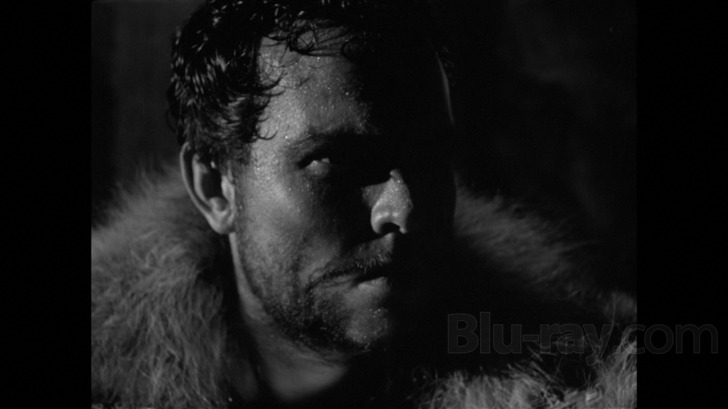
One of the most interesting things that Welles does with his adaptation of Macbeth is push the Three Witches front and center, emphasizing their obviously pagan roots and contrasting that against a culture where Christianity was beginning to have a significant toehold. This also plays into the whole moral subtext of the film, for at its core, Macbeth is a piece about the corrosive effects of conscience. Macbeth and Lady Macbeth (Jeanette Nolan in her first major film role) are devious schemers, but the fact remains they may have gotten away with their nefarious plans, not to mention their manifold murders, had not the internal conflict perpetrated by incipient guilt complexes intruded.
Welles’ visual mastery is also well on display throughout this film. Welles was beginning to have to deal with smaller and smaller budgets, but Macbeth rarely if ever shows its seams. Welles and his cinematographer John L. Russell brilliantly utilize shadow to mask sets that might otherwise look a little on the cheesy side. The film is awash in bizarre rock formations which seems to echo Macbeth’s deteriorating mental state. Welles also isn’t shy about using extreme camera angles to emphasize the inner worlds of the characters, and there are a couple of just plain weird but wonderful moments, including when Macbeth stares at his bizarrely deformed reflection in a twisted mirror. All of these elements make the film as visually stunning in its own way as was Citizen Kane.
Critical response to Macbeth at the time of its release was withering at best, and it’s really not hard to understand why. Compared to the relatively formal, restrained and classically theatrical renderings of Shakespeare in the Olivier films, Macbeth is almost like an example of Abstract Expressionism ported over to this tragedy of an ancient Scottish general assuming the kingship under corrupt influences. In Welles’ formulation, Macbeth isn’t quite the pawn that he might appear to be in Shakespeare’s text. Here Macbeth seems to have a cracked psyche almost from the get go, and if Lady Macbeth is able to exploit that fissure, who’s to blame her?
Many critics and viewers alike have derided some of the performances in this Macbeth, but I have to tell you from my standpoint, if the film is accepted on its own hyperbolic merits, there is a uniform excellence in the major players here that is to be relished. Welles’ performance is one of his most over the top, especially as the film careens toward its bloody climax. With his eyes alternately haunted and menacing, and his face an almost gargoyle-like grimace as madness descends, this is Welles at his most theatrical, and it’s a riveting ride virtually every step of the way. Nolan is perhaps too taciturn to fully convey the sort of animal magnetism that Lady Macbeth needs to have, but in a couple of fleeting scenes, there are copious hints given that she has the wiles to play Macbeth like a finely tuned violin. The supporting cast here is also quite interesting. Dan O’Herlihy makes an appealing Macduff and a barely older than adolescent Roddy McDowall is a callow Malcolm.
Welles’ emendations and condensations of the original Shakespeare may raise purists’ hackles, but the fact is even Olivier toyed with the original texts of the plays he ended up filming. (Read along with Hamlet, for example, as Olivier’s film unfolds for some illuminating revelations.) Macbeth was shot quickly on a veritable shoestring and Welles simply may have made some of the cuts for timeliness sake, but even in this altered form, this is a bristling and even disturbing version of Shakespeare’s enduring tragedy. The film has had its own kind of tragic history, as so many of Welles’ offerings seemed to. It was cut and recut, redubbed and rescored, all in an attempt to eke out a profit as it went through at least a couple of theatrical exhibitions over a span of several years. But like so many of Welles’ films, even the meddling influence of studio executives couldn’t completely diminish the inherent genius that was at least sporadically on display throughout the enterprise. This may in fact not be a paradigmatic Macbeth, but it is most certainly an unforgettable one.
Macbeth Blu-ray Movie, Video Quality 
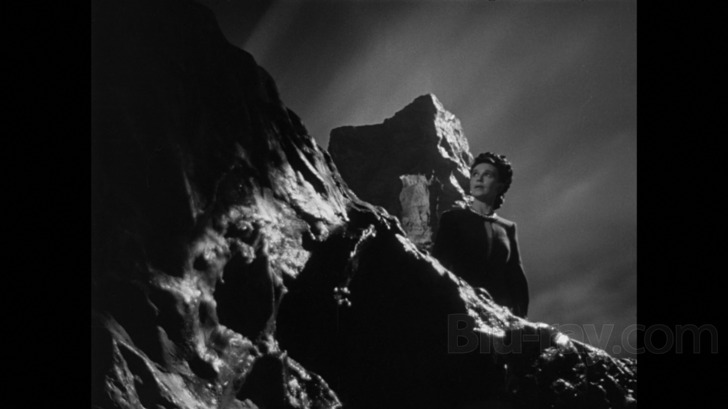
Macbeth is presented on Blu-ray courtesy of Olive Films with an AVC encoded 1080p transfer in 1.33:1. Evaluating the image quality of Macbeth must take into consideration the film's fairly tortuous history. Some who aren't aware of the manifold edits and ultimate restoration of this film who are seeing it for the first time may look at my 3.5 video score and think I'm out of my mind (so what else is new?). There are massive changes in density, sharpness, clarity and also different levels of damage throughout some of these elements, but taken as a whole, the bulk of Macbeth looks quite good indeed. Black levels are absolutely lustrous most of the time and the deep chiaroscuro cinematography by John L. Russell (who would go on to lens Hitchcock's Psycho) bristles with moodiness. There are a number of issues, however, and those who have never seen this title should be aware of them (those who have seen this restored version in its previous home video incarnations shouldn't be too surprised). A number of elements which have been restored are obviously not from the same generation that the bulk of the film is sourced from, with increased grain, fuzziness and lessened contrast, and several of the opticals look pretty shoddy as well. Scratches occasionally show up as do minor flecks and specks. These are fairly transitory issues, however, in what is easily the best Macbeth has ever looked in any home video format.
Macbeth Blu-ray Movie, Audio Quality 
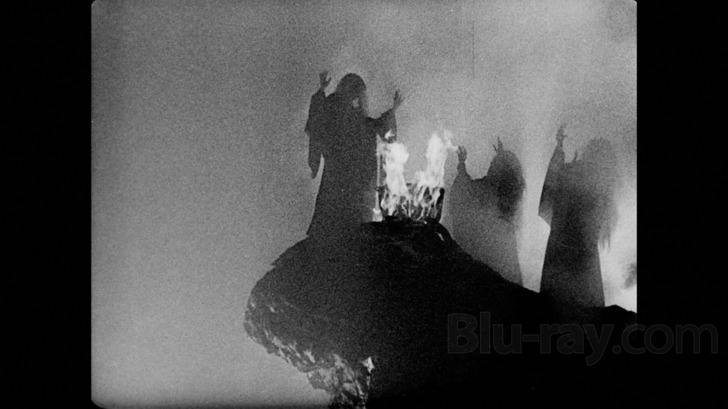
Macbeth's lossless DTS-HD Master Audio Mono mix faithfully reproduces the film's original soundtrack. Welles prerecorded this film, so the synch issues that are quite noticeable throughout have nothing to do with actual soundtrack problems and are instead endemic of the way the film was actually shot. There are some minor splicing issues that crop up now and again where little bits of dialogue have been reinserted back into the flow of the film (along with their attendant imagery). Overall, though, the dialogue is clean, if awfully heavily accented at times (this is one title that cries out for subtitles, something that Olive releases typically don't include). Jacques Ibert's dramatic score is also very well represented on this track.
Macbeth Blu-ray Movie, Special Features and Extras 
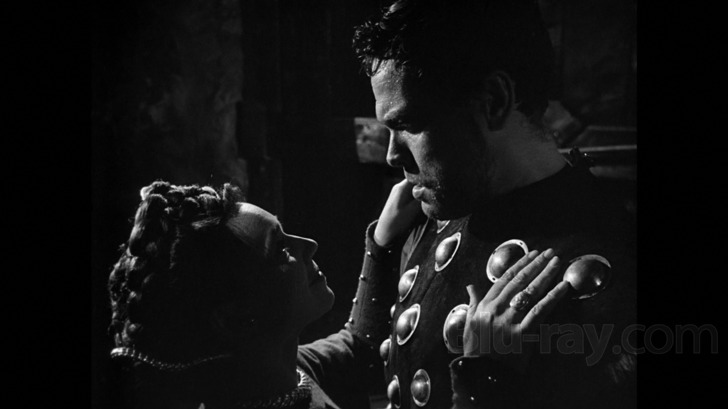
No supplements are included on this Blu-ray.
Macbeth Blu-ray Movie, Overall Score and Recommendation 
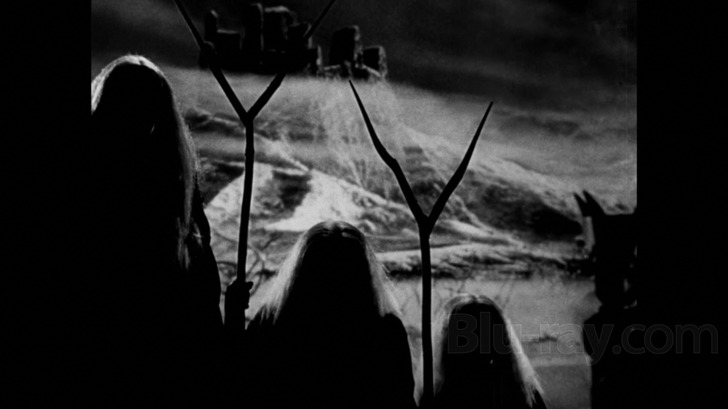
I have a deep and abiding admiration for a number of film adaptations of Shakespeare's work, including the great Olivier outings, Zeffirelli's Romeo and Juliet and even Branagh's somewhat stiff Hamlet, but I can honestly say few have affected me on such a subliminal level as Welles' moody take on Macbeth. The film has a near hallucinatory quality that makes it one of the most unusual and compelling film versions of any Shakespeare play. Welles pulls out all the stops, both from the standpoint of showy camera work and from his and his company's performances. This Macbeth plays almost like a horror film at times, and considering its source material, that may be entirely appropriate. This Blu-ray offers a considerably improved general level of image quality, though those who have never seen this film in its restored form before may be disappointed in the drastic levels of change various elements display. Even those anomalies shouldn't keep you away from this title. Highly recommended.
Similar titles
Similar titles you might also like

Macbeth
The Tragedy of Macbeth
1971

Macbeth
2015

Throne of Blood
蜘蛛巣城 / Kumonosu-jô
1957

Kagemusha
影武者
1980

Chimes at Midnight
1965

Richard III
1955

Henry V
1944

The Tragedy of Macbeth
2021

Age of Uprising: The Legend of Michael Kohlhaas
2013

Joan of Arc
1948

To Be or Not to Be
1942

The Hollow Crown: The Wars of the Roses
2016

Hamlet
1948

Othello
The Tragedy of Othello: The Moor of Venice / 1952 and 1955 versions
1951

Blonde Venus
1932

Sansho the Bailiff
山椒大夫 / Sanshô dayû
1954

The Flowers of War
金陵十三钗 / 金陵十三釵 / Jīnlíng Shísān Chāi
2011

Day of Wrath
Vredens dag
1943

A Night to Remember
1958

The Last Emperor 4K
Theatrical (4K/BD) and Television (BD) Versions
1987
